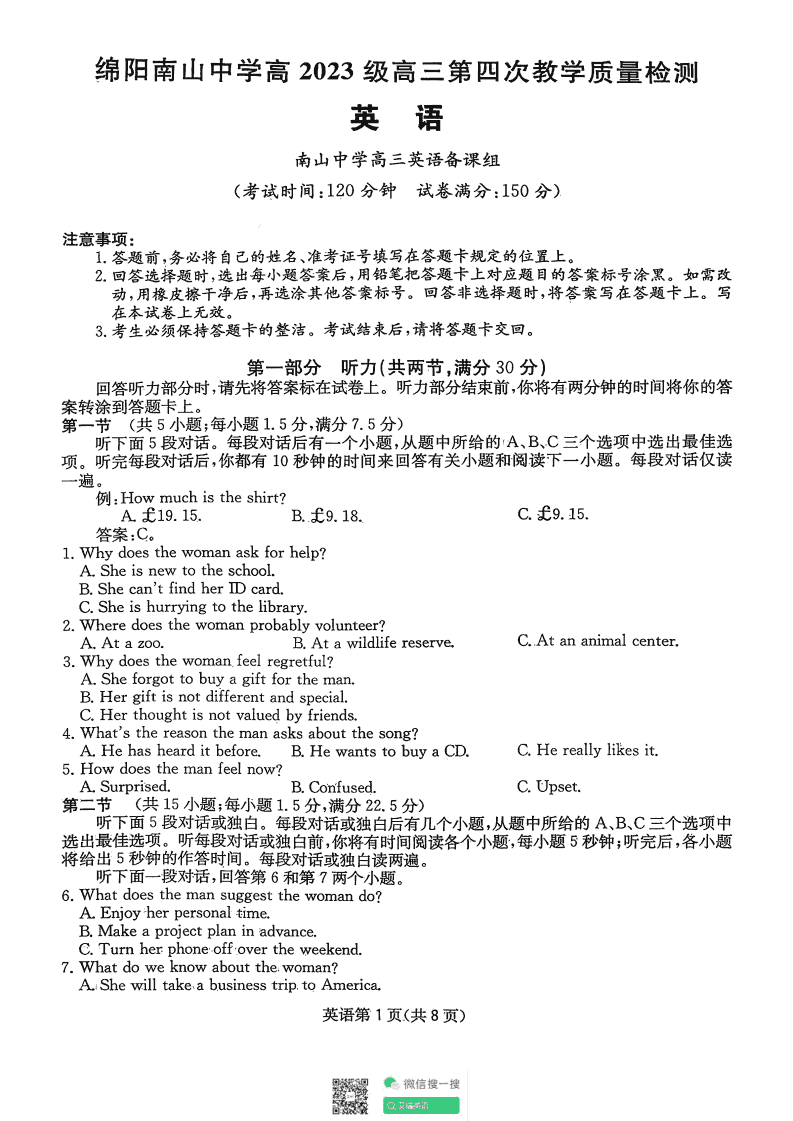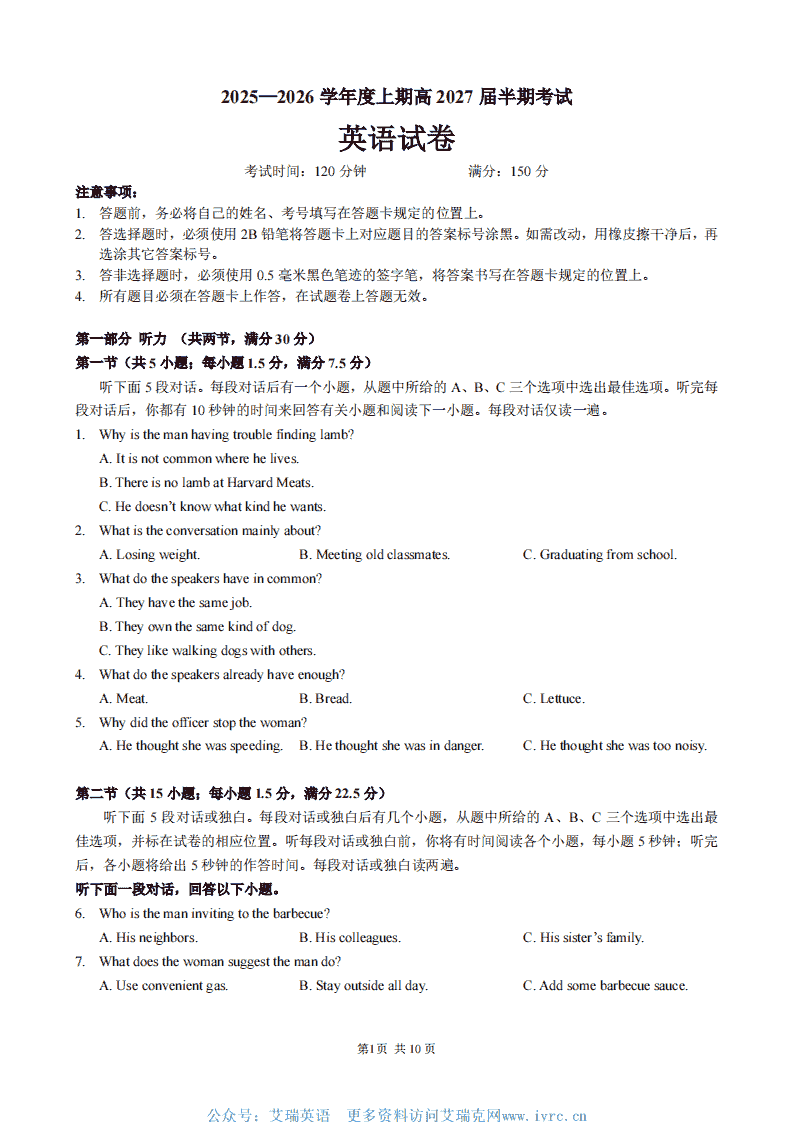
Welcome unit核心考点归纳
【重点单词】
|
1 |
design n. 设计;设计方案 vt. 设计;筹划(教材P2) |
|
归纳 拓展 |
(1)design sth. for 为……设计某物 be designed to do … 旨在做……,用于做…… (2)make designs for … 为……做设计 by design (=on purpose) 故意地(反义短语:by accident/by chance偶然地) (3)designer n. 设计者 |
①Our school invited two engineers to design_a_language_lab_for_us.
我们学校邀请了两位工程师为我们设计一个语言实验室。
②Project Hope is_designed_to_help those children who drop out of school because of poverty.
希望工程旨在帮助那些因为贫困而辍学的孩子。
③An Italian architecture designer is to make_designs_for the new bridge.
一位意大利建筑设计师打算为这座新桥进行设计。
|
2 |
anxious adj. 焦虑的;不安的(教材P4) |
|
归纳 拓展 |
(1)be anxious about 为……担心/担忧 be anxious (for sb.) to do sth. 急于(让某人)做某事 be anxious that … 渴望……(从句谓语用should do, should可省略) (2)anxiety n. 担心;焦虑;渴望 with anxiety 焦虑地 (3)anxiously adv. 焦虑地 |
①She is_anxious_to_go to college, but anxious_about not passing the college entrance examination.
她渴望上大学,但又担心不能通过高考。
②She was_anxious_for_them_to_leave her room.
她渴望他们离开她的房间。
③We were_anxious_that everyone (should) know the truth.
我们渴望人人都了解实情。
④Watching him climb up the cliff, everybody was breathless with_anxiety.
看着他往悬崖上爬,大家都捏一把汗。
|
3 |
annoyed adj. 恼怒的;生气的(教材P4) |
|
归纳 拓展 |
(1)be/get annoyed with sb. 对某人感到生气 be annoyed at/about sth. 因某事生气 (2)annoy vt. 使恼怒;打扰 annoy sb. with sth./by doing sth. 因(做)某事使某人烦恼 (3)annoying adj. 使人不高兴的;恼人的;烦人的 |
①He was beginning to get_very_annoyed_with me about my carelessness.
因为我粗心大意,他已开始恼火了。
②Eleanor was_annoyed_at having had to wait so long for him.
埃莉诺为不得不等他这么长时间而感到很恼火。
③I like to pretend that I’m okay because I don’t want to annoy_people_with my problems.
我喜欢装作没事,只是不想因自己的问题去麻烦到别人。
④Try making a note of the things which annoy you.
试着把烦心事写下来。
|
4 |
impression n. 印象,感想(P4) |
|
归纳 拓展 |
(1)sb.’s first impression of … 某人对……的第一印象 leave/have/make a … impression on sb.给某人留下……的印象 (2)impress vt. 使印象深刻 impress sb. with sth. 某事给某人留下印象 impress sth. on/upon sb. 使某人铭记某事;使某人明白某事物的重要性 be impressed with/by … 对……有深刻印象 (3)impressive adj. 给人印象深刻的 |
①We were_impressed_by the new teacher’s rich knowledge and humorous talk.
新老师渊博的知识、风趣的谈吐给我们留下了深刻的印象。
②I am very impressed_with the new airport.
新机场给我留下了很深的印象。
③He has told me his plans and he’s made_a_good_impression_on me.
他已经把他的计划告诉我了,从而给我留下了好印象。
④The bridge is not as impressive as some guides would have you believe.
这座大桥并不像有些导游说的那么雄伟。
|
5 |
concentrate vi.& vt. 集中(注意力);聚精会神(教材P4) |
|
归纳 拓展 |
(1)concentrate on sth. 集中精力于某事 concentrate sth. on sth./on doing sth. 集中……于/做某事 concentrate one’s attention on 把注意力集中在……上 (2)concentration n. 集中;专心 concentrated adj. 全力以赴的;集中的;浓缩的 |
①I can’t concentrate_on my studies with all that noise going on.
吵闹声不绝于耳,我无法集中精力学习。
②We should concentrate_our_attention_on the teachers’ lecture, thus we can make great progress.
我们应该把注意力集中在老师的讲课上,这样我们才能取得很大的进步。
③This book requires a great deal of concentration.
这本书需要全神贯注才能读懂。
【重点短语】
|
1 |
What_if no one talks to me? 要是没有人和我说话怎么办?(教材P4) |
|
归纳 拓展 |
What if … ? (1)意为“如果……将怎么办?”,可以看作是“What will happen if … ?”的省略形式; (2)还可表示“即使……又有什么关系?”,可以看作是“What does it matter if … ?”的省略形式。 |
①What_if anything should happen to the child?
万一这孩子出了差错怎么办?
②So what_if sometimes they stayed rather late? It doesn’t mean anything.
因此,即便有时他们熬夜到很晚,那又怎样?那也说明不了什么。
【单元语法-简单句句型】
特点:谓语动词是不及物动词,本身能表达完整的意思,后面不需接宾语,但有时后跟状语修饰动词。状语一般由副词、介词短语、分词和分词短语、名词、不定式或相当于副词的词或短语来担当。其位置一般放在句末,但也可放在句首或句中。
The rain stopped.
雨停了。
The time passed quickly.
时间过得很快。
The old man walks in the park every morning.
那个老人每天早上在公园里散步。
特点:动词不能表达一个完整的意思,必须加上一个表明主语的身份、特征、类属、状态等的表语。系动词除了be动词之外,还有:
①表示感官的动词:feel, appear, look, smell, taste, sound等;
②表示状态延续的动词:remain, stay, keep, continue等;
③表示转变、变化的动词:become, get, turn, go, run, fall, come, grow等。
My sister is a nurse.
我姐姐是个护士。
I feel quite hungry.
我感觉很饿。
Leaves turn yellow in autumn.
秋天树叶变黄了。
特点:谓语动词是及物动词,不能表达完整的意思,其后必须要接一个宾语,即动作的承受者。作宾语的可以是:名词、代词、动词不定式、疑问词+动词不定式、动词-ing形式和从句等。有时宾语后会接副词、介词短语、不定式等作状语。
We are learning English.
我们正在学习英语。
I don’t know how to get there.
我不知道怎么去那儿。
I like to stay at home on Sundays.
星期天我喜欢待在家里。
特点:谓语动词后接有两个宾语,这两个宾语都是动作的对象或承受者,其中指人的是间接宾语,指物的是直接宾语。当间接宾语放在直接宾语之后时,其前通常需要加介词for或to。
Her mother bought her a skirt.
她妈妈给她买了一条裙子。
Mr Li told an interesting story to us.
李先生给我们讲了一个非常有趣的故事。
名师点津 常跟双宾语的动词:①需借助于to的动词:bring, give, lend, hand, offer, pass, promise, return, send, show, teach, tell, write等;②需借助于for的动词:buy, call, cook, choose, draw, find, get, make, order, sing, save, spare等。
特点:谓语动词后虽然已接有一个宾语,但意思还不完整,必须再加上另外一个成分(宾语补足语)对宾语进行补充说明。可以用作宾语补足语的有名词、形容词、不定式、动名词、分词、介词短语等。
The news made us very sad.
那个消息令我们非常难过。
The teacher asked us to answer the question.
老师叫我们回答那个问题。
I heard my name called.
我听到有人在叫我的名字。
名师点津 用it作形式宾语,而将真正的宾语放到宾语补足语的后面以使句子结构平衡,是英语常用的结构。即:“主语+谓语+it+宾补+真正的宾语”。it作形式宾语,通常和下列动词连用:consider, think, make, find, believe, feel, guess, imagine, judge, prove, see, suppose, take等。
特点:There be … 意思是“有”,表示“人或事物的存在”或“某地有某物”。There be … 属倒装结构,后面的名词是句子的主语。There be中的be有时可以是lie, stand, used to be, seem to be, appear to be等。
There are two people waiting outside.
有两个人正在外面等候。
There happened to be nobody around.
碰巧周围没有人。
【写作指导】
本单元的写作任务是应用文类别中的“学生自我介绍”写作。在写作时需要注意的是,要对个人信息进行筛选,分好主要点和次要点,不能一味地把自己的所有信息都放在作文中。
一、基本结构
1.第一部分——学生的基本信息。
2.第二部分——学习生活的趣事或难题。
3.第三部分——朋友相处情况。(还可以写关于家庭方面的内容。)
二、注意事项
1.写作文体:自我介绍写作属于应用文。
2.主体时态:文章通常以一般现在时为主,也可以根据需要适当使用其他时态。
3.主体人称:第一人称。
经典句式
一、开头常用语
1.May I introduce myself? My name is …
我来自我介绍一下吧,我叫……
2.Attention! A teenage boy is coming to you.
注意!一个青少年男孩正向你走来。
3.Hi! I’m come from … High School.
你好!我是来自……高中。
二、正文常用语
1.When I was 15, I weighted 100kg.
我15岁时,体重达到了100公斤。
2.A strange, quiet girl.
一个古怪、寡言的女孩。
3.I like playing team sports such as football and rugby.
我喜欢玩足球、橄榄球之类的团队运动项目。
4.square up to sb./sth.
勇敢地面对某人/某事
三、结尾常用语
1.All in all …
总而言之……
2.Last but not least …
最后一个,但并不是不重要……
3.We must try our best to study.
我们必须努力学习。
经典例题
假定你是李华。下学期你将作为交换生(exchange student)去加拿大一所高中学习,住在Lynn家里。请给Lynn写一封邮件,内容包括:
1.介绍自己;
2.告知到达时间;
3.询问应做何准备。
注意:1.词数80左右;
2.可以适当增加细节,以使行文连贯。
[精彩范文]
Dear Lynn,
I’m Li Hua, an exchange student from China. Glad to know that I’ll be staying with your family while studying at a local senior high school. Learning this information, I feel extraordinarily excited because I can have the chance to communicate with you natives. I will arrive in Toronto on August 20th and get to your place late that afternoon. I wonder if you could give me some advice so that I can get myself better prepared for my stay in Canada.
Looking forward to seeing you.
Yours sincerely,
Li Hua
总评
该作文覆盖了所有的内容要点:作了自我介绍,有了到达时间并询问准备事项;全文无任何语法错误,而且准确使用了较复杂的语法结构和难度较大的词汇;并且有效使用了语句间的连接成分,全文结构紧凑。
[亮点呈现]
Learning this information, I feel extraordinarily excited中非谓语动词的使用使得文章言简意赅;I wonder if you could give me some advice so that I can get myself better prepared for my stay in Canada. 一句中宾语从句和结果状语从句的使用使得句式多样化,文章生动而流畅,体现了作者驾驭句式的能力。
实战演练
假定你是李华。你在互联网上看到美国高中生Frank希望结识一位中国朋友的信息。请你给他发一封电子邮件。邮件的内容包括:
1.表示愿意和对方交朋友;
2.简要介绍自己,如爱好、特长;
3.希望多了解美国文化。
注意:1.词数80左右;
2.可以适当增加细节,以使行文连贯。
扫码访问小程序中的本文

















暂无评论内容